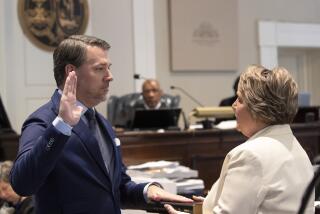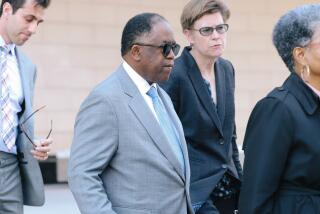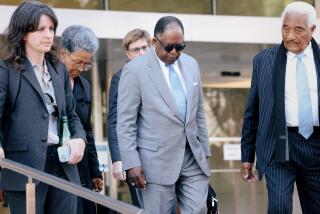Mayor ‘Guilty as Hell,’ Bailiff Reportedly Said : More Charges Fly on Eve of Hedgecock Hearing
- Share via
Hoping to bolster San Diego Mayor Roger Hedgecock’s bid for a new trial, defense attorneys Monday filed sworn statements from four persons alleging that a court bailiff, who supervised the mayor’s jury, told acquaintances that he believed Hedgecock was guilty before the verdict was even returned.
The affidavits were filed by attorney Oscar Goodman on the eve of today’s new-trial hearing. A ruling against the mayor might prompt him to resign immediately, Hedgecock confidants said Monday.
Monday’s affidavits include charges by a local lawyer that Bailiff Al Burroughs Jr. told him during Hedgecock’s first trial that Hedgecock was “guilty as hell.” The father of one of the witnesses in Hedgecock’s case also swore that Burroughs, during a court recess, told him that he believed that the mayor was guilty, while a city official charged that the bailiff made a similar remark while the two men were at their sons’ soccer practice.
Goodman hopes to introduce the sworn statements as evidence at today’s hearing, at which Superior Court Judge William L. Todd Jr. is scheduled to decide whether the mayor’s felony conviction should be reversed because of the jury-tampering charges against Burroughs, who is Todd’s bailiff.
The new sworn statements filed Monday apparently represent an attempt to bolster jury-tampering charges made against Burroughs by two jurors after the Oct. 9 conviction of Hedgecock on 13 counts of felony perjury and conspiracy in connection with his 1983 mayoral campaign.
In one of the affidavits, local lawyer Clyde C. Crockett said that shortly before the closing arguments in Hedgecock’s first trial--which ended last February in a mistrial with the jury deadlocked 11-1 in favor of conviction--he appeared in Todd’s courtroom for a settlement conference in a personal injury case. Crockett is the husband of Darlee Crockett, who was the campaign manager of Hedgecock’s 1984 reelection race.
While in the courtroom, Crockett said that he chatted with the court reporter and clerk “on how they felt things were going” in Hedgecock’s case.
Crockett said Burroughs “joined in (the conversation) and was very adamant that Roger Hedgecock was ‘guilty as hell’ and that (then-Assistant) Dist. Atty. Richard Huffman would win the case hands down . . . . There was no doubt in my mind that marshal Al Burroughs had strong convictions to the fact that Mayor Hedgecock was guilty.”
Scott Harvey, the City of San Diego’s director of intergovernmental relations, said in his statement that he had a similar conversation with Burroughs in September while they waited for their sons’ soccer practice to conclude in Mission Valley. Harvey said Burroughs “volunteered that he always felt Mayor Roger Hedgecock was guilty of (a) misdemeanor conflict-of-interest charge, and that the prosecution had made its case on this allegation.”
“He (Burroughs) stated that if the jury found Hedgecock guilty of the misdemeanor, they would more easily find him guilty of all other counts,” Harvey wrote.
Ironically, the misdemeanor charge--which involved a vote when Hedgecock was serving on the county Board of Supervisors before he was elected mayor--was one of three charges on which the mayor was acquitted in October.
Additional statements filed Monday included those from Lloyd Whitworth, the father of Maureen Whitworth, a former Hedgecock supporter who testified at the mayor’s trial, and Harry L. Carter.
Neither Goodman nor Deputy Dist. Atty. Charles Wickersham, who prosecuted the case, could be reached for comment. Burroughs’ attorney, Anthony Beccarelli, also was unavailable for comment.
Meanwhile, criminal law experts say that Todd will have two critical decisions to make today as he weighs whether to grant Hedgecock a new trial:
First, Todd must decide whether Burroughs did anything improper during 6 1/2 days of deliberations. Then, if Todd finds that there was jury tampering, he must rule on whether the improprieties could reasonably have been expected to influence the jurors’ decision-making process and its outcome.
Precedent helps define the framework for the judge’s ruling, the legal experts say, but leaves ample leeway for judicial discretion.
The central evidence today will consist of sworn declarations from the jurors and from Bailiffs Burroughs and Holly Murlin describing what occurred while the jury was sequestered at a Mission Valley hotel. Last week, Todd ruled that he will allow no oral testimony at today’s hearing.
Hedgecock’s attorneys pin their hopes for a new trial on the claims of two jurors that Burroughs exerted pressure on the jury to reach a verdict and helped jurors to understand the crucial legal concept of “reasonable doubt.” Prosecutors, however, have produced statements from the 10 other jurors, and Burroughs and Murlin, claiming that there was no such interference.
Legal precedent prohibits the judge from taking the obvious course in determining whether the deliberations were affected by tampering: He cannot consider the jurors’ own statements about the impact of outside influences.
“He has to make his own determination about whether the remarks made by the bailiff influenced the juror,” said Hank McGee, a UCLA law professor.
The law professors agreed that if Todd is convinced that even one juror’s opinion might have been swayed, the outcome could be “contaminated” and he must grant Hedgecock a new trial.
“If any one juror was affected, that’s it,” McGee said. “The whole thing would collapse.”
More to Read
Sign up for Essential California
The most important California stories and recommendations in your inbox every morning.
You may occasionally receive promotional content from the Los Angeles Times.













